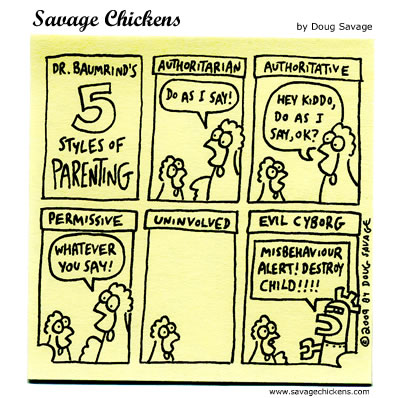Here’s an understatement: Parenting is complex.
I grew up with extremely strict parents who expected nothing but absolute obedience. Open communication was punished. They adopted an Authoritarian parenting style, characterized by high demandingness (total obedience, strict rules and boundaries, and punishment) and low responsiveness (praise, encouragement, support, etc.). I ended up as an excellent student and a well-behaved child and teenager – the kind of kid that every parent wants. I was also unassertive, lacked confidence, and extremely self-critical.
I understand my parent’s desire to be strict. Aside from the fact that it was how they were raised (and I believe they simply didn’t know better), they felt it was the best way to motivate me to be successful and not end up dead or in jail, to put it bluntly. Both my professional knowledge and personal judgment tell me, however, that I would likely have been a different, perhaps a “better” person, if I had received an equal balance of love and support along with the discipline (also known as Authoritative parenting). I will never know.
Here’s what I’ve always wondered though: Does strict, authoritarian parenting necessarily result in well-behaved children? And what happens to the parent-child relationship as the child becomes an adult? (I still see my parents as authority figures, which makes it difficult for me to want to make a deeper connection with them – I just don’t feel I have it in me, I guess.).
I turned to the data we collected for our Parenting Style Test (regular readers of my blog will know that I also turn to stats and facts when I want to resolve emotional issues!). Here’s what the data tells me:
Of those who have an excellent relationship with their children:
- 73% are Authoritative
- 2% are Authoritarian
- 5% are Permissive (parents who are very loving and responsive, but don’t really discipline or set boundaries)
- 5% are Uninvolved/Neglectful (parents who are not very loving and responsive, and who don’t set boundaries)
Of those who have a “so-so” relationship with their children:
- 52% are Authoritative
- 17% are Authoritarian
- 21% are Permissive
- 10% are Uninvolved/Neglectful
Of those who have a poor relationship with their children:
- 15% are Authoritative
- 62% are Authoritarian
- 8% are Permissive
- 15% are Uninvolved/Neglectful
Of those whose children are well-behaved:
- 74% are Authoritative
- 5% are Authoritarian
- 19% are Permissive
- 2% are Uninvolved/Neglectful
Of those whose children are not well-behaved:
- 35% are Authoritative
- 29% are Authoritarian
- 29% are Permissive
- 7% are Uninvolved/Neglectful
Here are a few other things I discovered about these parenting styles:
When asked whether they “love their children unconditionally”:
- 98% of Authoritative parents agreed
- 61% of Authoritarian parents agreed
- 96% of Permissive parents agreed
- 54% of Uninvolved/Neglectful parents agreed
When asked whether they consider it important to praise a child and let them know that they are loved:
- 96% of Authoritative parents agreed
- 53% of Authoritarian parents agreed
- 97% of Permissive parents agreed
- 57% of Uninvolved/Neglectful parents agreed (yup – the neglectful parents consider this slightly more important than the Authoritarian parents)
When asked about whether they liked the idea of the whole family sitting around the table, discussing their day:
- 71% of Authoritative parents agreed
- 50% of Authoritarian parents agreed
- 62% of Permissive parents agreed
- 37% of Uninvolved/Neglectful parents agreed
When asked if they consider important for parents to be on the same page in regards to how their children are raised:
- 86% of Authoritative parents agreed
- 52% of Authoritarian parents agreed
- 81% of Permissive parents agreed
- 64% of Uninvolved/Neglectful parents agreed (yup, the neglectful parents outnumbered the Authoritarian again).
And here’s another thing: Despite the fact that Authoritarian parents make it a point to set strict rules and boundaries and keep their children in line, only 37% trust that their children will make the right choices (77% for Authoritative, 80% for Permissive, 50% for Uninvolved/Neglectful => WOW).
I’m all for setting rules and boundaries; it’s what Authoritative parents and Authoritarian parents do best. But without love and support to balance things out, Authoritarian-raised children will learn to fear their parents, and with time, may even grow to resent them.
Parenting, unfortunately, doesn’t come with a handbook. Although some would say that there is no “right” way when it comes to raising kids, research has shown that firmness, responsiveness, and support tend to have a positive impact on children.
Of course, you can always try the newly-developed 5th parenting style:
Insightfully yours,
Queen D


